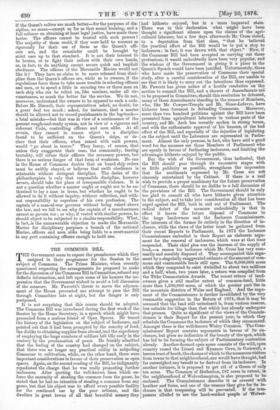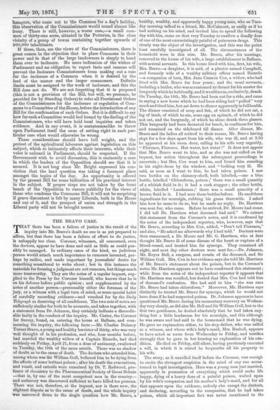THE COMMONS BILL. T HE Government seem to repent the prominence
which they assigned in their programme for the Session to the subject of Commons. The Prime Minister, when recently questioned respecting the arrangements he proposed to make for the discussion of the Commons Bill in Committee, refused any definite information, and left upon some of his hearers the im- pression that the Government wished to avoid a full discussion of the measure. Mr. Fawcett's threat to move the adjourn- ment of the House prevented one attempt to pass the Bill through Committee late at night, but the danger is only postponed.
It is not surprising that this course should be adopted. The Commons Bill was introduced during the first week of the Session by the Home Secretary, in a speech which might have proceeded from a zealous friend of Open Spaces. He traced the history of the legislation on the subject of Inclosure, and pointed out that it had been prompted by the scarcity of food, the dislike to obtaining supplies from abroad, and the expediency of employing the large numbers of soldiers left idle early in the century by the proclamation of peace. He frankly admitted that the feeling of the country had changed on the subject, that there was no longer any practical utility in subjecting Commons to cultivation, while, on the other hand, there were important considerations in favour of their preservation as open spaces. Again, on the second reading of the Bill, he indignantly repudiated the charge that he was really promoting further inclosures. After quoting the well-known lines which en- force the enormity of stealing the common from the goose, he stated that he had no intention of stealing a common from any goose, but that his object was to afford every possible facility for the continued use by the poor artisans, and the dwellers in great towns of all that beautiful scenery they had hitherto enjoyed, but in a more improved state. There was in this declaration what might have been thought a significant silence upon the claims of the agri- cultural labourer, but a few days afterwards Mr. Cross stated, to a deputation from that class, "that he believed the practical effect of the Bill would be to put a stop to inclosures ; in fact, it was drawn with that object." Now, if the Commons Bill had been accepted as carrying out these professions, it would undoubtedly have been very popular, and the wisdom of the Government in giving it a place in the Queen's Speech would have been justified. Unfortunately, those- who have made the preservation of Commons their special study, after a careful consideration of the Bill, are unable to see that it is likely to carry out the intentions thus expressed._ Mr. Fawcett has given notice of a hostile resolution on the motion to commit the Bill, and a shower of Amendments are to be proposed in Committee, should this resolution be defeated,. many of these Amendments standing in the names of Members,. who, like Mr. Cowper-Temple and Mr. Shaw-Lefevre, have hitherto been foremost in defending Commons. Moreover, more than two hundred petitions against the Bill have been presented from agricultural labourers in various parts of the country, and Mr. Arch has recently spoken in strong terms, and with the enthusiastic approval of his hearers, of the bad effect of the Bill, and especially of the injustice of legislating on the subject until the Labourers are represented in Parlia- ment. Almost the only persons, in fact, who have said a goody word for the measure are those Members of Parliament who, are openly in favour of furthering inclosures, and limiting the- advantages hitherto enjoyed by the public. But the wish of the Government, thus indicated, that the Bill should pass through its successive stages with as little publicity as possible, strengthens the impression that the sentiments expressed by Mr. Cross are not sincerely entertained by the Cabinet. If there is a real' wish to provide a proper machinery for the future preservation of Commons, there should be no dislike to a full discussion of the provisions of the Bill. The Government should be only too glad to consult all who have hitherto given attention to the subject, and to take into consideration all that has been urged against the Bill, both in and out of Parliament. The- radical defect of the measure undoubtedly is that in effect it leaves the future disposal of Commons to the large landowners and the Inclosure Commissioners. The interests of the former lie entirely in the direction of in- closure, while the views of the latter must be gathered from their recent Reports to Parliament. In 1872 the Inclosure' Commissioners embodied in their Report an elaborate argu- ment for the renewal of inclosures, which were at that time suspended. Their chief plea was the increase of the supply of food,—a reason for inclosure which Mr. Cross has very sum- marily and sensibly disposed of. They accompanied this 'argu- ment by a singularly exaggerated estimate of the amount of com- mons and commonable lands still open. The -8,000,000 acres which they computed to exist dwindled to about two millions and a half, when, two years later, a return was compiled from the Tithe Commutation Awards. The recent return of land- owners gives a still smaller extent of common-land, little more than 1,500,000 acres, of which the greater part lies in the mountain districts of Wales and England. And the argu- ment of the Commissioners is further invalidated by the very reasonable suggestion in the Return of 1874, that it may be assumed that the land still uninclosed is, from various reasons, less suitable for tillage than that which has already undergone that process. Quite as significant of the views of the Comnais- sioners is their Report for the present year, in which they schedule the Commons the inclosure of which they recommend. Amongst these is the well-known Wisley Common. The Com- missioners' Report contains arguments in favour of its en- closure, but gives no indication of the beauty of the spot, which has led to its forming the subject of Parliamentary contention already. Another doomed open space consists of the wild, open country round the Lizard and Kynance Cove, in Cornwall, a barren tract of heath, the charms of which to the numerous visitors from towns to that neighbourhood, one would have thought, had far outweighed any benefit to be derived from its inclosure. In another instance, it is proposed to get rid of a Green of only ten acres. The Common of Hatherton, 187 acres in extent, in the neighbourhood of Wolverhampton, is also proposed to be enclosed. The Commissioners describe it as covered with heather and furze, and one of the reasons they give for its in- closure is that trespassing will be prevented. If the tres- passers alluded to are the hard-worked people of Wolver-
liampton, who come out to the Common for a day's holiday, this observation of the Commissioners would sound almost like irony. There is still, however, a worse case,—a small com- mon of thirty-one acres, situated in the Potteries, in the close vicinity of a group of towns containing together upwards of 200,000 inhabitants.
If these, then, are the views of the Commissioners, there is great reason in the objection that to place Commons in their power and in that of the large landowners is simply to hand them over to inclosure. No mere indication of the wishes of Parliament and no obligation to report facts and reasons will prevent the Indosure Commissioners from making out a case for the inclosure of a Common when it is desired by the lord of the manor and the larger commoners. Definite limits must be assigned to the work of inclosure, and this the Bill does not do. We are not forgetting that it is proposed (this is not a provision of the Bill, but will, we presume, be provided for by Standing Orders) to refer all Provisional Orders of the Commissioners for the inclosure of regulation of Com- mons to a Committee of the .House, before the introduction of any Bill for the confirmation of such Orders. But it is difficult to say how far such a Committee would feel bound by the finding of the Commissioners, who will have held local inquiries and taken evidence. And in any event, it is unstatesmanlike to throw upon Parliament itself the onus of setting right in each par- ticular case what would otherwise be wrong.
These considerations should have full weight, and the protest of the agricultural labourers against legislation on this subject, which so intimately affects their interests, while their voice is unheard in Parliament, should be respected. If the Government wish to avoid discussion, this is eminently a case in which the leaders of the Opposition should see that it is secured. It is not long since Mr. Bright expressed his con- viction that the land question was taking a foremost place amongst the topics of the day. An opportunity is offered by the present Bill for some indication of his practical interest in the subject. If proper steps are not taken by the front bench of the Opposition to ensure publicity for the views of those who condemn the Commons Bill, it will not be surprising if grave discontent is felt by many Liberals, both in the House and out of it, and the prospeet of union and Strength in the Liberal party will not be brought nearer.































 Previous page
Previous page